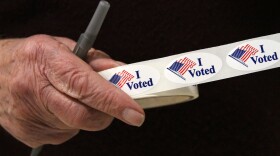The recent effort to investigate a nearly 400-vote discrepancy in Windham’s 2020 election results is poised to cost the state at least $123,000. But it’s not entirely clear how those and other outstanding expenses will be paid for, since the law authorizing the audit didn’t include any funding.
“We knew it was going to be expensive,” Associate Attorney General Anne Edwards said. “We didn’t know what the total was going to be, and we still don’t know what the total is.”
The $123,000 total so far includes broadcasting, security and facility expenses related to a three-week, in-person audit hosted at a New Hampshire National Guard facility in May. It doesn’t yet factor in any payments to three outside auditors who oversaw that process. It also doesn’t include other lingering technology and personnel expenses, so the final bill could be even higher.
Once all of the invoices are in, Edwards said the Attorney General’s office plans to submit requests to the Joint Legislative Fiscal Committee and the Executive Council to cover the costs.
“When you’re hiring three experts to do this kind of work and you’re spending essentially three weeks in a facility with people working from eight o’clock in the morning until six, six-thirty, seven o’clock at night, that’s going to add up quickly,” Edwards said.
The state and the town of Windham agreed to split the tab for the auditors before the process got underway earlier this year. Under the law that launched the audit, each side was required to select one auditor, and those two auditors were then required to jointly choose a third auditor.
The state will cover expenses for its auditor, “ethical hacker” and cybersecurity expert Harri Hursti, and half of the expenses related to the third auditor, University of California Berkley statistic professor Philip Stark. State officials say they are still awaiting both Hursti and Stark’s final invoices.
Windham Town Manager David Sullivan said the town has paid its chosen auditor, Verified Voting Co-Director Mark Lindeman, $2,500 for his role in the investigation. Windham is also still awaiting an invoice for its share of Stark’s expenses.
State officials also agreed to cover the bulk of the rest of the costs related to the in-person portion of the audit before it got underway in May. The law mandating the audit put the New Hampshire Secretary of State and Attorney General in charge of transporting ballots, arranging security and ensuring that the process could be live-streamed, so the state agreed to pick up those and other costs related to the audit infrastructure.
Security and live-streaming costs make up the biggest chunk of the audit expenses tallied so far. The state was billed nearly $53,000 from one local production company, Edify Multimedia Group, for equipment, labor and other costs related to a livestream that broadcast around the clock throughout the three-week audit. The state was billed another $5,400 by Events United, another local production company, for additional labor and live-streaming services.
The audit also racked up about $57,000 in New Hampshire State Police personnel costs, including about $16,000 in overtime. State police provided security throughout the in-person portion of the audit in May, staying on-site after-hours to guard ballots and other supplies.
It cost the state about $2,800 to rent space at a New Hampshire National Guard training facility to conduct the in-person portions of the audit. The state also spent nearly $3,900 on boxed lunches for the state officials and volunteers working on the audit.
Edwards said the state is likely to incur some additional technology-related expenses related to the video recordings of the audit. There could also be additional overtime costs for attorney general investigators who were on-site for the audit in May.
The trio of auditors leading the investigation recently submitted their final report on the cause behind the gap in Windham’s election results, explaining that the issue stemmed from folded absentee ballots that were misread by the town’s ballot-counting devices.
Several more reports stemming from the Windham audit are still due from here. The Attorney General and Secretary of State are required to produce their own report on the audit and “any resulting recommendations.”
The state’s Ballot Law Commission will meet next week to review the audit’s findings in order to produce its own report, as required by the audit law. The commission is supposed to focus its report on the performance of the ballot counting devices, since it has final approval over what devices can be used in New Hampshire. Right now, only one model is approved, and local election officials have been reporting mechanical troubles with the aging machines since long before the Windham situation surfaced.








